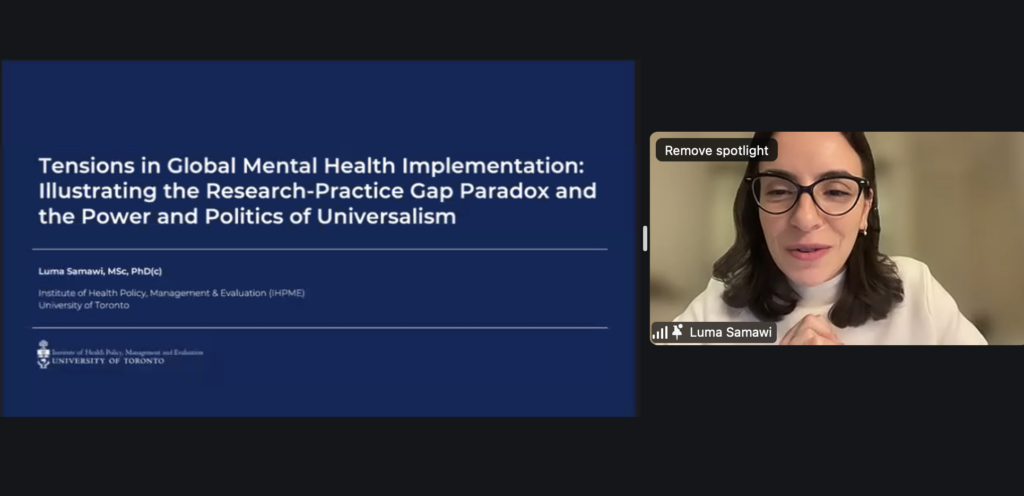Post
Published on March 3, 2025

On Wednesday, January 22, Luma Samawi, PhD Graduate Student at the University of Toronto, delved into the complexities of implementing mental health interventions in low resource settings. She explored the challenges of translating evidence based interventions into routine practice through a presentation and discussion.
Samawi outlined Jordan’s mental health reform efforts, led by the Ministry of Health and World Health Organization (WHO), which aimed to shift services from psychiatric hospitals to primary care and community based settings. A key initiative, the Mental Health Gap Action Programme (mhGAP), was designed to equip primary care providers with the tools to assess, treat and refer patients with mental health conditions. Despite its implementation in over 90 countries, she highlighted persistent challenges in scalability and long term integration into health systems.

A significant issue discussed was the “Train and Hope” approach, where training efforts receive funding and reporting priority, yet there is little follow-up, supervision or outcome evaluation. Samawi emphasized that after 15 years, there is no formal assessment of mhGAP’s impact in Jordan, raising concerns about the sustainability of the program.
She introduced implementation science as a framework for systematically integrating interventions into practice. However, she questioned whether models developed in high income countries are feasible in resource constrained settings, where governance, infrastructure and financial stability differ significantly. Moreover, the discussion portion of the seminar highlighted systemic barriers, including donor driven priorities, governance fragmentation, and workforce turnover, reinforcing the need for locally informed, context specific solutions. The seminar concluded with reflections on the power and politics of universalizing mental health interventions, urging a shift toward implementation strategies tailored to diverse global health settings.
Connect with Luma Samawi.
Themes | Global Health Foresighting |
Status | Active |
Related Work |
N/A
|
Updates |
N/A
|
People |
N/A
|
You may also be interested in...
Internship Program: Summer 2023 In Review
This summer, the Dahdaleh Institute has worked with wonderful students through our dynamic, experiential education Global Health Internship Program. The program offers students to contribute to exciting research projects by working on literature reviews, data ...Read more about this Post
Recap — Using Social Media and Topic Modelling to Understand Acceptance of the Booster Jab
In the past, trending tweets have demonstrated their potential to influence the behaviours of individuals both online and in the real world, as seen with movements like #ObedientsMovement, #OperationDudula, and #FeeMustFall. Recently, on July 26, ...Read more about this Post
Key Moments from the Trust and Political Sociology of Health Workshop
The "Trust and Political Sociology of Health" research workshop took place on April 4th at the Dahdaleh Institute for Global Health Research, York University. This forum brought together senior and emerging scholars, practitioners, and students ...Read more about this Post
